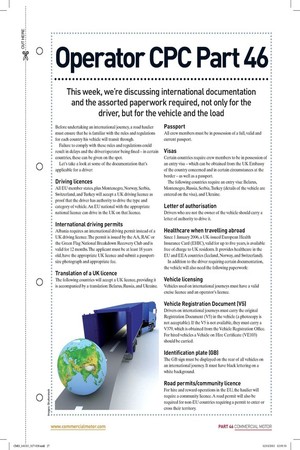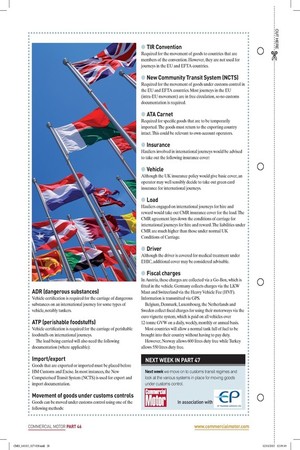Operator CPC Part 46
Page 21

Page 22

If you've noticed an error in this article please click here to report it so we can fix it.
This week, were discussing international documentation and the assorted paperwork required, not only for the driver, but for the vehicle and the load
Before undertaking an international journey, a road haulier must ensure that he is familiar with the rules and regulations for each country his vehicle will transit through.
Failure to comply with these rules and regulations could result in delays and the driver/operator being fined — in certain countries, these can be given on the spot. Let's take a look at some of the documentation that's applicable for a driver: Driving licences
All EU member states, plus Montenegro, Norway, Serbia, Switzerland, and Turkey will accept a UK driving licence as proof that the driver has authority to drive the type and category of vehicle. An EU national with the appropriate national licence can drive in the UK on that licence. International driving permits
Albania requires an international driving permit instead of a UK driving licence. The permit is issued by the AA, RAC or the Green Flag National Breakdown Recovery Club and is valid for 12 months. The applicant must be at least 18 years old, have the appropriate UK licence and submit a passportsize photograph and appropriate fee. Translation of a UK licence
The following countries will accept a UK licence, providing it is accompanied by a translation: Belarus, Russia, and Ukraine. Passport
All crew members must be in possession of a full, valid and current passport. Visas
Certain countries require crew members to be in possession of an entry visa — which can be obtained from the UK Embassy of the country concerned and in certain circumstances at the border — as well as a passport.
The following countries require an entry visa: Belarus, Montenegro, Russia, Serbia, Turkey (details of the vehicle are entered on the visa), and Ukraine. Letter of authorisation
Drivers who are not the owner of the vehicle should carry a letter of authority to drive it. Healthcare when travelling abroad
Since 1 January 2006, a UK-issued European Health Insurance Card (EHIC), valid for up to five years, is available free of charge to UK residents. It provides healthcare in the EU and EEA countries (Iceland, Norway, and Switzerland). In addition to the driver requiring certain documentation, the vehicle will also need the following paperwork: Vehicle licensing
Vehicles used on international journeys must have a valid excise licence and an operator's licence. Vehicle Registration Document (V5)
Drivers on international journeys must carry the original Registration Document (V5) in the vehicle (a photocopy is not acceptable). If the V5 is not available, they must carry a V379, which is obtained from the Vehicle Registration Office. For hired vehicles a Vehicle on Hire Certificate (VE103) should be carried. Identification plate (GB)
The GB sign must be displayed on the rear of all vehicles on an international journey. It must have black lettering on a white background. Road permits/community licence
For hire and reward operations in the EU, the haulier will require a community licence. A road permit will also be required for non-EU countries requiring a permit to enter or cross their territory. ADR (dangerous substances)
Vehicle certification is required for the carriage of dangerous substances on an international journey for some types of vehicle, notably tankers. ATP (perishable foodstuffs)
Vehicle certification is required for the carriage of perishable foodstuffs on international journeys. The load being carried will also need the following documentation (where applicable): Import/export
Goods that are exported or imported must be placed before HM Customs and Excise. In most instances, the New Computerised Transit System (NCTS) is used for export and import documentation. Movement of goods under customs controls Goods can be moved under customs control using one of the following methods: • TIR Convention
Required for the movement of goods to countries that are members of the convention. However, they are not used for journeys in the EU and EFTA countries. New Community Transit System (NCTS)
Required for the movement of goods under customs control in the EU and EFTA countries. Most journeys in the EU (intra-EU movement) are in free circulation, so no customs documentation is required. ATA Carnet
Required for specific goods that are to be temporarily imported. The goods must return to the exporting country intact. This could be relevant to own-account operators. Insurance Hauliers involved in international journeys would be advised to take out the following insurance cover: • Vehicle
Although the UK insurance policy would give basic cover, an operator may well sensibly decide to take out green card insurance for international journeys. IP Load
Hauliers engaged on international journeys for hire and reward would take out CMR insurance cover for the load. The CMR agreement lays down the conditions of carriage for international journeys for hire and reward. The liabilities under CMR are much higher than those under normal UK Conditions of Carriage. Driver
Although the driver is covered for medical treatment under EHIC, additional cover may be considered advisable. • Fiscal charges
In Austria, these charges are collected via a Go-Box, which is fitted in the vehicle. Germany collects charges via the LKW Maut and Switzerland via the Heavy Vehicle Fee (HVF). Information is transmitted via GPS.
Belgium, Denmark, Luxembourg, the Netherlands and Sweden collect fiscal charges for using their motorways via the euro vignette system, which is paid on all vehicles over 12-tonne GVVV on a daily, weekly, monthly or annual basis.
Most countries will allow a normal tank full of fuel to be brought into their country without having to pay duty.
However, Norway allows 600 litres duty free while Turkey allows 550 litres duty free.








































